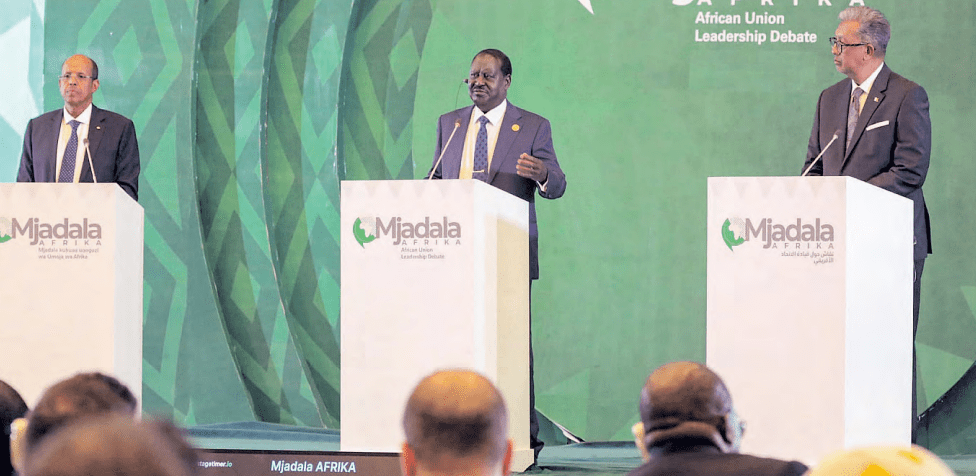Facebook Twitter (X) Instagram Somali Magazine - People's Magazine
Djibouti’s Foreign Minister, Mahamoud Ali Youssouf, has been elected as the new Chairperson of the African Union Commission (AUC) following a highly competitive election. The vote took place during the 38th Ordinary Session of the African Union Assembly in Addis Ababa, Ethiopia, where Youssouf emerged victorious after seven rounds of voting. His main contenders included Kenya’s former Prime Minister Raila Odinga and Madagascar’s former Foreign Minister Richard Randriamandrato.
Youssouf, who has served as Djibouti’s Foreign Minister since 2005, is set to take over from Chad’s Moussa Faki Mahamat, who has led the AU Commission since 2017. His election marks a significant shift in the leadership of the African Union at a time when the continent faces numerous challenges, including political instability, military coups, and economic struggles. Youssouf’s extensive diplomatic experience, which includes serving as Djibouti’s Ambassador to Egypt from 1997 to 2001, played a key role in securing his victory.

The election process was highly contested, reflecting the growing influence of African diplomacy on the global stage. In the final round, Youssouf secured 33 votes, surpassing Odinga, who had been a strong candidate backed by several influential African leaders. Despite the loss, Odinga gracefully accepted the outcome and extended his congratulations to Youssouf, emphasizing the importance of democracy and unity in Africa. His concession speech highlighted the need for collective efforts to strengthen the African Union and address pressing continental issues.
Youssouf’s victory comes at a crucial time when the African Union faces criticism for its handling of conflicts across the continent. The ongoing instability in regions such as the Sahel, eastern Democratic Republic of Congo, and Sudan has placed significant pressure on the AU to take decisive action. Additionally, the recent wave of military coups in West Africa, including Niger, Mali, and Burkina Faso, has raised concerns about democratic backsliding. Youssouf is expected to focus on peace and security, fostering diplomatic solutions to these crises and strengthening the AU’s role in conflict resolution.
Economic development and regional integration are also likely to be major priorities under Youssouf’s leadership. The African Continental Free Trade Area (AfCFTA), which aims to boost intra-African trade and economic growth, requires strong leadership to navigate challenges related to implementation and cooperation among member states. Additionally, issues such as youth unemployment, climate change, and access to healthcare remain critical areas where the AU Commission’s leadership will be tested.
The election of Youssouf also reflects Djibouti’s growing diplomatic influence in Africa. Despite being a small nation, Djibouti has played a strategic role in regional politics due to its geographical location at the crossroads of global trade routes. Hosting several international military bases and serving as a key player in the Horn of Africa, Djibouti has leveraged its position to strengthen its ties with major global powers while maintaining an active role in African affairs. Youssouf’s appointment is expected to further solidify Djibouti’s standing in continental politics.
As Youssouf prepares to assume office, expectations are high regarding his ability to steer the African Union toward greater unity and effectiveness. The need for decisive leadership has never been more pressing, with Africa facing multiple crises that require coordinated efforts at the continental level. His experience in diplomacy and foreign affairs will be crucial in ensuring that the AU remains a strong and credible institution capable of addressing the needs of its member states.
His tenure will also be closely watched by international stakeholders, as Africa’s geopolitical significance continues to rise. The AU’s partnerships with global organizations such as the United Nations, European Union, and BRICS nations will be key areas where Youssouf’s leadership will be tested. Strengthening Africa’s voice on the global stage, particularly in areas such as climate policy, trade negotiations, and security cooperation, will be among the major challenges he will face.
With his election, the African Union enters a new chapter, and the success of Youssouf’s tenure will largely depend on his ability to unite member states, address security concerns, and push forward economic initiatives. As Africa continues to navigate complex political and economic landscapes, the AU’s role in shaping the continent’s future remains critical. All eyes will now be on Youssouf as he takes on this influential position, with hopes that his leadership will bring renewed energy and strategic direction to the African Union.

